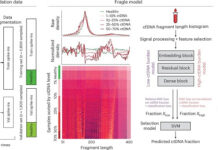Researchers at the A*STAR Genome Institute of Singapore (GIS) have unveiled a new artificial intelligence (AI)-based method called Fragle that can rapidly and cost-effectively track cancer progression through simple blood tests. Published in Nature Biomedical Engineering (March 2025), this breakthrough promises to transform cancer monitoring by analyzing DNA fragment sizes in the bloodstream.
How Fragle Works
Fragle requires only a small blood sample. It uses AI to detect unique patterns in the size of DNA fragments—known to differ between healthy and cancerous cells. Unlike traditional circulating tumor DNA (ctDNA) tests, which rely on costly and complex sequencing to identify patient-specific mutations, Fragle offers a more universal and streamlined approach.
Reliable, Affordable, and Ready for Hospitals
Clinical trials show that Fragle delivers consistent, accurate results across hundreds of patient samples and various cancer types. It is also highly compatible with existing DNA profiling methods used in hospitals and commercial labs, allowing for easy integration into current workflows.
Notably, Fragle’s estimated cost is under SGD $50—significantly less than existing ctDNA tests that exceed SGD $1000.
Detecting Relapse Earlier
Fragle excels at detecting minimal residual disease (MRD)—tiny traces of cancer that remain after treatment. By identifying these signals early, doctors can monitor treatment response more effectively and intervene before a full relapse occurs.
Looking Ahead
As reported by medicalxpress, the A*STAR GIS team is now working with the National Cancer Center Singapore (NCCS) to explore clinical applications, particularly in lung cancer patients. In an ongoing study involving over 100 trial participants, researchers are tracking ctDNA every two months to predict therapy response and detect relapse sooner than standard scans.
“We hope Fragle can reshape cancer monitoring globally,” said Dr. Wan Yue, Executive Director at A*STAR GIS. “Our aim is to deliver better, faster, and more accessible cancer care.”
























